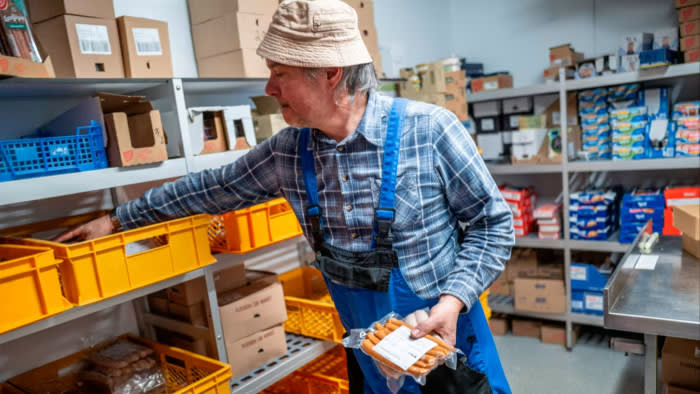Good afternoon. With Parliament in recess and half the world still on some form of Easter holiday, I had intended to keep this week’s newsletter both briefer than usual, and a news-free zone, using the quieter holiday period to zoom out and look at the big picture possibilities of ‘life after Brexit’.
But then, just as everyone was emerging from their Easter egg sugar coma, the Department for Environment, Food and Rural Affairs slipped out the news that consignments of EU plant and animal products will face charges of up to £145 when imported into Britain.
On one level, you can’t blame the government: at some point the UK had to erect a border, for reasons of biosecurity and fairness (UK exporters to the EU have faced such checks and charges from day one) and the consequences of Brexit can’t be wished away forever.
And yet, in true Brexit style, these charges come at the eleventh hour (they start in just 26 days time, on April 30) after five delays and a flip-flop over whether they’d be needed at all. The reaction of a broad swath of trade lobby groups was unanimous: unvarnished anger.
The British Chambers of Commerce; Logistics UK; the Food and Drink Federation; the British Retail Consortium; the Cold Chain Federation; the Horticultural Trades Association and the Institute of Export & International Trade all warned the charges would push up food prices, reduce choice and “hammer” smaller businesses.
At the same time, the British Ports Association warned the charges were “at the lower end” of expectations and likely insufficient to enable them to recoup the hundreds of millions of pounds spent building Brexit border facilities at the government’s behest. So no one is happy.
The challenges of absorbing the charges are best described by SMEs themselves. People like Susann Schmieder, the chief importer at German Deli, a small business that has sold German food products in the UK for the past 20 years, who reached out in despair.
New bureaucratic requirements for EU exporters to Britain mean she hasn’t been able to place an order with her main sausage supplier since January. She is already paying €150 for health certificates on the three product lines she is still able to import, out of 16 originally.
Now she’ll pay an additional £145 charge on a mixed pallet of products for the store. She writes: “I’m sure you hear that from every small company, but how are we supposed to make money and survive????”
Indeed. As Marco Forgione, director-general of the Institute of Export & International Trade, pointed out, for SMEs an additional £145 per consignment “might mean their entire profit being wiped out completely”.
But moving from the micro to the macro, it is clear from the response of trade groups to the Common User Charge announcement that none of them believe that the current government will be returned to power at the next election.
Any bridges that may have existed between lobbyists and this government can increasingly be burnt, in the hope that a new (presumably, Labour) government will take a different approach.
It remains one of the enduring mysteries of Brexit that the same people who dismissed the costs of doing a ‘reverse trade deal’ with the UK’s largest market (turning quick and cheap trade processes into slow and expensive ones) simultaneously lionised the benefits of doing smaller deals that reduced barriers in faraway places like New Zealand and Australia. It could never be both.
In the grand scheme of things, the Common User Charge and its associated paperwork is just one more small drag on UK goods trade — and one more upward pressure on food prices. But it is also another step in crystallising the reality of Brexit and putting it into pounds, shillings and pence.
Brexit was one of four ‘big mistakes’
And as yet another poll (two this week) predicts a Labour landslide, expectation is growing about what a Keir Starmer government might do to extract Britain from the morass of low productivity and investment into which it has sunk since the 2008 financial crisis.
Pumping air into that bubble is a new book by the economist Will Hutton, which I’ve been thumbing through over Easter. Its title, This Time No Mistakes, should be enough to make Starmer gulp as he prepares to take on the role of prime minister.
It’s a book that is far broader than Brexit. It sets the vote to leave in a much wider framework of the final exhaustion of Thatcherite ideas — just one of four ‘big mistakes’, the other three being excessive monetarism, financial deregulation and austerity.
“Perhaps the only unexpected benefit of Brexit,” Hutton writes, “is that it has been such an obvious failure.”
Hutton argues that the pressures of delivering Brexit and the lurch to the right under Liz Truss has reduced the Conservative party to an “association of cults” — the ‘five families’ of the Tory right and an increasingly beleaguered One Nation rump.
Hutton’s central argument is that investment is the only route to growth, not the recent Tory prescription of squeezing public sector spending, seeking to reduce national debt and cutting taxes which — even when done in the name of promoting growth — has the opposite effect.
What is striking is how Hutton, a key member of the Labour intellectual firmament, craves ambition that, to date, has been so conspicuously lacking from Starmer and his shadow chancellor Rachel Reeves.
He asserts that taxes will have to rise and that money for investment can be found — from the markets, from a new network of consolidated pension superfunds and from new taxes on environmental harms, which will drive a virtuous circle of growth. He writes:
“Financial markets actually approve of investment and higher growth rates; they will buy British government debt to finance it. New revenue sources, particularly derived from taxing environmental harms and wealth, can be created. The overall tax take will first have to rise to finance vital additional public investment, rescue public services in crisis and so catalyse more growth.
The British were deceived by politicians who appealed to the electorate’s demons rather than its better angels. Reassociating ourselves with the EU is vital — it cannot be dodged, like the refusal for thirty years to revalue residential property.”
You can feel Hutton priming the pump hard, not least, I suspect, because if you analyse Reeves’s recent Mais Lecture, Labour’s rather anaemic industrial strategy and its red lines over European engagement there is clearly considerable space for encouragement.
If you want the antidote to Hutton’s urgent optimism about the possibilities of remaking Britain around a public-private investment boom, I can point you to Janan Ganesh’s column explaining why, based on past experience, the promised renaissance is likely to end in disappointment.
Either way, in a political world where the incoming government is apparently so scared of making big arguments about how it would remake Britain, if elected, perhaps Hutton’s book does at least give voice to ambitions that dare not (yet) speak their name.
Housekeeping note: I am away next week, on a trip examining how effective freeports are as a vehicle for levelling up, so will be leaving you in the capable hands of my colleague Andy Bounds, who will provide the view from Brussels.
Britain after Brexit is edited by Gordon Smith. Premium subscribers can sign up here to have it delivered straight to their inbox every Thursday afternoon. Or you can take out a Premium subscription here. Read earlier editions of the newsletter here.
Also Read More: World News | Entertainment News | Celebrity News









